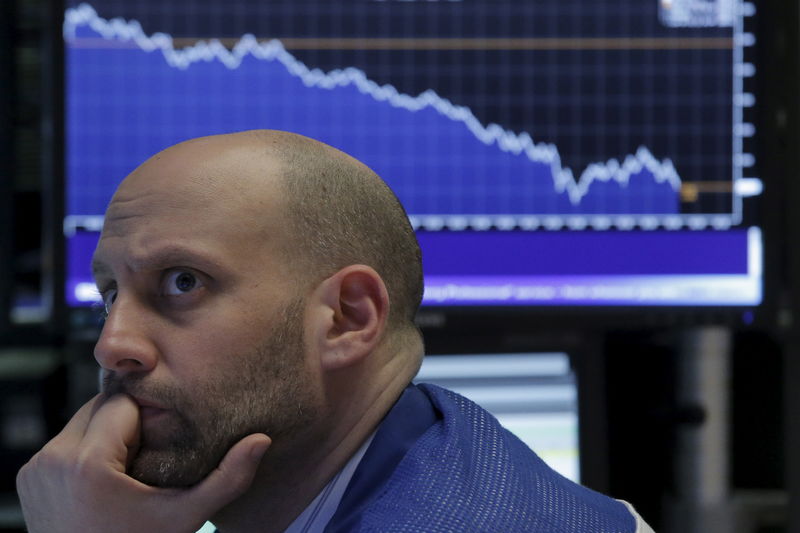Dow Jones, Nasdaq, S&P 500 weekly preview: Neck-and-neck election nears conclusion
Investing.com -- US stocks climbed Friday as Amazon (NASDAQ:AMZN ) led gains in the tech sector, kicking off November on a positive note despite a lackluster jobs report.
The Dow Jones Industrial Average rose 288.73 points, or 0.69%, to end at 42,052.19. The S&P 500 gained 0.41% to finish at 5,728.80, while the Nasdaq Composite added 0.8%, closing at 18,239.92.
Amazon shares surged 6.2%, driven by strong performance in its cloud and advertising divisions that lifted earnings above Wall Street expectations. Intel (NASDAQ:INTC ) shares also jumped 7.8% after surpassing revenue forecasts and providing an optimistic outlook.
Meanwhile, the US jobs report released Friday showed only 12,000 jobs were added in October, significantly below the 100,000 forecast by Dow Jones and marking the weakest job growth since December 2020.
The unemployment rate remained at 4.1%, in line with expectations.
However, market participants largely shrugged off the disappointing data, attributing it to temporary factors such as recent hurricanes and a Boeing (NYSE:BA ) strike.
The week as a whole was volatile. The S&P 500 ended down 1.4% for the week, with the Nasdaq losing 1.5% due to post-earnings declines from Microsoft (NASDAQ:MSFT ) and Meta Platforms (NASDAQ:META ). The Dow edged down 0.2% over the same period. All eyes on the US election
The US presidential election on Tuesday is set to dominate attention this week as the race remains tightly contested between the two candidates. Depending on how close the outcome is, the results may be known by Wednesday morning or could take days as ballots continue to be tallied nationwide.
Swing states like Pennsylvania, Georgia, and North Carolina will be focal points, with the presidential inauguration scheduled for January 2025.
The latest New York Times/Siena College poll shows Harris holding narrow leads in Nevada, North Carolina, and Wisconsin, while Trump is ahead in Arizona. The situation in Michigan, Georgia, and Pennsylvania remains extremely close, with both candidates effectively tied.
Margins in all seven key states fall within the poll's margin of error, indicating no clear frontrunner.
Both Harris and Trump have viable paths to reach the 270 Electoral College votes required for victory, barring any significant polling inaccuracies. Given the tight nature of the race, even minor polling errors could lead to substantial shifts in the outcome.
Trump has seen gains in Pennsylvania, where earlier New York Times/Siena College polls showed Harris leading by four points.
Meanwhile, Arizona is the only state where Trump holds an advantage among those who have already voted, with 46% of respondents saying they cast their ballots and Trump leading 50% to 46% among that group.
Strategists at JPMorgan said in a recent note that financial markets could mirror the patterns seen during the 2016 election.
They note that equities might experience a "knee-jerk bounce" if Trump wins, similar to the 2016 response. However, the extent of any continued upward movement would likely “depend on the magnitude of the bond yields response, as well as on whether the initial focus will be trade, or the economy/taxes.”
Strategists also highlight that current investor positioning differs greatly from November 2016. Today, positioning is at higher levels, whereas it was more restrained back then. Moreover, fiscal balances have deteriorated since that time.
If Kamala Harris wins, uncertainty surrounding corporate tax policies could rise, but equity performance “might see as a support the reduced tariffs risks in that scenario,” according to JPMorgan.
Unlike in 2016, when Trump's unexpected victory and the market's reaction surprised investors, the note points out that a Trump win is now more broadly anticipated. Investors have already taken long positions in equities, potentially capping the scope for a substantial market rally.
Apart from the election, the markets will also focus on several global central bank decisions in the coming days, including the Fed and Bank of England on Thursday.
Moreover, several high-profile companies are set to report earnings this week, including Super Micro Computer (NASDAQ:SMCI ) on Tuesday, Arm Holdings ADR (NASDAQ:ARM ) and Qualcomm (NASDAQ:QCOM ) on Wednesday, as well as Pinterest (NYSE:PINS ) and Rivian (NASDAQ:RIVN ) on Thursday. What analysts are saying about US stocks
Wedbush: “From a Big Tech/AI trade perspective we view overall a Harris White House win as more bullish on the margins and a Trump win as a net negative for Big Tech. However, with many races on the Senate and House up for grabs a gridlock result with a mix of blue and red in the Beltway would complicate any major policy changes for Big Tech in the near-term.”
Evercore ISI: “The Election, despite what pundits say, will not itself end the Bull market. 100 years of stock market history from DJIA 200 to 42,000, through Presidents and Parties, say as much.”
“The Bull market looks to remain intact, yet with the potential for either a post-Election “meltup” or “selloff”.”
Bank of America: “We believe implications to equities from the election will be more nuanced than what the headline might suggest. Profits matter more for stocks than politics and the election will remove the overhang more than anything, in our view. In general, we believe a big knee-jerk reaction (2%+) should be faded. SPX moved more than 2% only 25% of the time on election days since 1928.”
Morgan Stanley: “In equities, certain sectors perceived to benefit from Republican policies (financials and industrials) have been recent outperformers, though some of this is tied to sector-specific fundamentals. Where we have seen a clearer performance trend that suggests certain stocks may be discounting a higher probability of a Republican win is within consumer retail and brands. Some of these stocks that are disproportionately exposed to tariff risk have underperformed notably, as have renewables. And, of course, if the Democrats win, many of these recent market moves could unwind, but that shouldn’t be taken as a signal of long-term macro expectations.”
Source: Investing.com
